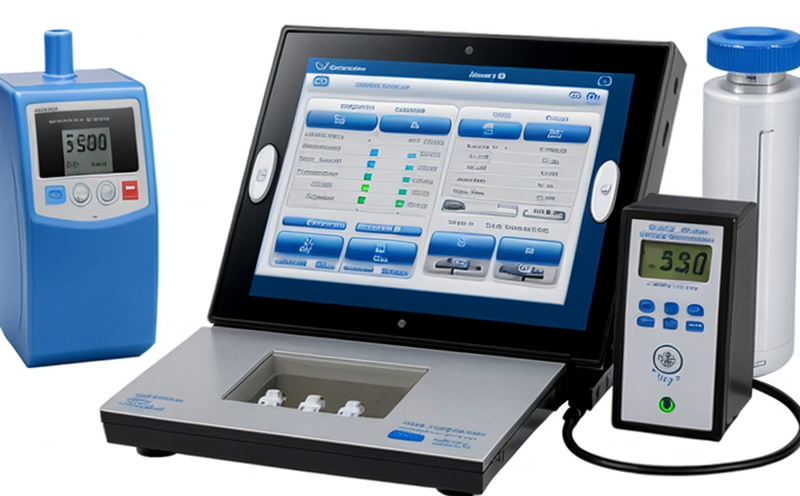Bolus Dose Accuracy Testing for Infusion Pumps
In medical device testing, particularly within the realm of infusion pumps and drug delivery systems, ensuring precise bolus dose accuracy is paramount. Bolus doses are small, rapid infusions often administered to deliver a quick burst of medication or fluid directly into the patient's bloodstream. This test evaluates whether an infusion pump can accurately administer these bolus doses according to prescribed parameters. The importance of this testing cannot be overstated; inaccuracies in bolus dose administration could lead to serious medical complications.
The test involves subjecting the infusion pump to various scenarios that mimic real-world conditions, including different patient profiles and varying medication types. It is conducted under controlled laboratory settings using standardized procedures aligned with international standards such as ISO 17895:2017 for drug delivery systems. The infusion pump is programmed with specified bolus doses, which are then compared against the actual delivered volume.
The testing apparatus typically includes programmable syringes and precision volumetric pipettes to ensure precise calibration of the bolus dose. A key aspect involves monitoring the pump's response time and accuracy across multiple repetitions. Compliance officers and quality managers rely on these tests to verify that their devices meet regulatory requirements such as those set by the United States Food and Drug Administration (FDA) and European Union Medical Device Directive.
R&D engineers use this testing to identify potential improvements in pump design, software algorithms, or hardware components. By understanding how various factors—such as patient weight, medication type, and ambient temperature—affect bolus dose accuracy, they can refine their prototypes before commercialization. For procurement teams, ensuring compliance with these tests is crucial for selecting reliable suppliers who adhere to high-quality standards.
Accurate bolus dose delivery ensures that patients receive the correct amount of medication at critical moments, which is essential in managing various medical conditions effectively. The precision required in this testing underscores why it is a cornerstone of quality assurance processes in the healthcare industry.
Why It Matters
The reliability and accuracy of bolus dose delivery through infusion pumps are critical for patient safety and effective treatment outcomes. Inaccuracies can lead to underdosing or overdosing, which may result in suboptimal therapeutic effects or adverse side effects. For instance, underdosing a diabetic patient could exacerbate their condition while overdosing might cause severe hypoglycemia.
From a regulatory perspective, ensuring compliance with stringent testing protocols helps manufacturers avoid costly recalls and legal ramifications. Regulatory bodies like the FDA and European Medicines Agency (EMA) enforce strict guidelines to protect public health. Meeting these standards not only ensures product safety but also enhances brand reputation and trust among healthcare providers.
In clinical settings, accurate bolus dose delivery plays a vital role in optimizing patient care by providing tailored treatments based on individualized dosing regimens. This precision supports better treatment adherence and improves overall patient outcomes. Healthcare professionals appreciate the importance of reliable infusion pumps that deliver consistent results, thereby enabling them to focus more on patient care rather than troubleshooting technical issues.
Why Choose This Test
Selecting the Bolus Dose Accuracy Testing service is essential for several reasons. Firstly, it provides comprehensive validation of your infusion pump's performance under diverse conditions, ensuring its reliability across various clinical scenarios. Secondly, this testing aligns with international standards such as ISO 17895:2017, providing a robust framework for quality assurance.
- Comprehensive Validation: The test evaluates the pump's performance in real-world conditions, offering insights into its behavior under different patient profiles and medication types.
- International Standards Compliance: Ensuring that your infusion pumps meet global standards enhances their acceptance across international markets.
- Risk Management: By identifying potential issues early on, you mitigate risks associated with substandard products reaching the market.
- Patient Safety: Accurate bolus dose delivery supports better treatment outcomes and minimizes the risk of adverse events.
For quality managers and compliance officers, this service offers a structured approach to ensuring product safety and regulatory compliance. R&D engineers benefit from detailed data that can inform iterative design improvements. Procurement teams gain confidence in selecting reliable suppliers who adhere to high-quality standards.
Competitive Advantage and Market Impact
- Enhanced Patient Safety: By ensuring accurate bolus dose delivery, you contribute to improved patient outcomes, which is a significant differentiator in the healthcare market.
- Regulatory Compliance: Meeting rigorous testing standards positions your product favorably with regulatory bodies like the FDA and EMA, enhancing market access.
- Innovation Leadership: Leading-edge testing capabilities can drive innovation within your organization, setting a benchmark for industry standards.
- Customer Trust: Consistent quality and reliability build trust among healthcare providers and patients, fostering long-term relationships.
The ability to consistently deliver accurate bolus doses through your infusion pumps provides a competitive edge in the marketplace. It demonstrates your commitment to patient safety and regulatory compliance, which are crucial factors influencing purchasing decisions by hospitals and clinics worldwide.





